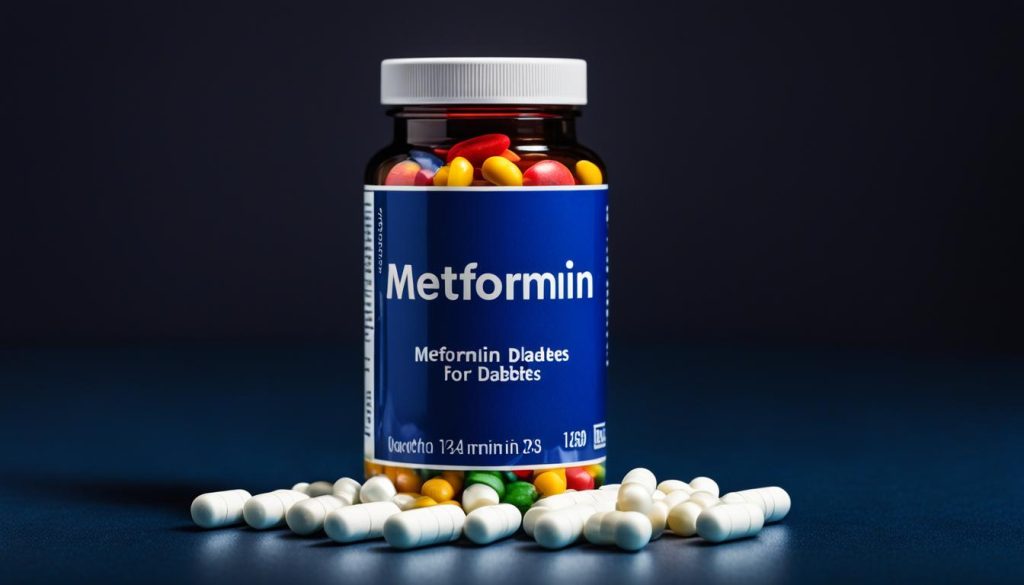Have you ever considered that the prescription drugs you are taking could be robbing your body of important nutrients? It’s a disturbing thought, but one that we need to address. Many medications, although necessary for our health, can have unintended consequences. One such consequence is drug-induced nutrient depletion, where certain medications can interfere with the absorption of essential nutrients in our bodies, leading to nutrient deficiencies.
Drug side effects and medication-nutrient interactions are more common than you may think. In fact, certain prescription drugs can deplete vital nutrients like magnesium, calcium, vitamin B-12, and potassium over time. This can have significant implications for your overall health and well-being.
To ensure that you safeguard your health and mitigate the risks associated with drug-induced nutrient depletion, it is important to be informed and proactive. By familiarizing yourself with the potential nutrient deficiencies caused by drugs, you can take necessary precautions and discuss them with your doctor, making sure your treatment plan takes into account these considerations.
Now, let’s explore some of the medications that are commonly associated with nutrient depletion:
Prescription Drugs That are Robbing Your Body of Important Nutrients
- Some prescription drugs can interfere with the absorption of vital nutrients in the body.
- Nutrient depletion caused by medication can lead to deficiencies in magnesium, calcium, vitamin B-12, and potassium, among others.
- It is important to discuss potential nutrient depletions with your doctor when starting or continuing medication.
- Antacids like Nexium and Prilosec, which are proton pump inhibitors, can deplete magnesium, calcium, and vitamin B-12.
- A diabetes medication called Metformin can decrease vitamin B-12 levels, especially in individuals with insufficient dietary intake of this nutrient.
- Blood pressure medications in the thiazide diuretics category, such as chlorthalidone and hydrochlorothiazide, can deplete potassium and magnesium.
- Monitoring nutrient levels and considering dietary changes or supplementation can help prevent and manage nutrient deficiencies caused by medication.
Antacids that work as Proton Pump Inhibitors
Antacids like Nexium and Prilosec, which are proton pump inhibitors, have become popular options for managing acid reflux and heartburn. These medications work by reducing the production of stomach acid, providing relief for individuals suffering from these conditions. However, it is important to be aware of the potential side effects associated with long-term use of these antacids.
Prolonged use of proton pump inhibitors can lead to nutrient depletion, particularly affecting levels of magnesium, calcium, and vitamin B-12. This is because these medications can interfere with the body’s ability to absorb these essential nutrients. Research has shown that these side effects are more prevalent in females and patients younger than 30.
If you have been taking antacids like Nexium or Prilosec for more than two weeks, it is crucial to follow the package instructions and consult your doctor. They can evaluate your individual situation and determine if any nutrient deficiencies are present. Regular monitoring and appropriate supplementation might be required to mitigate the potential risks associated with nutrient depletion. Remember, your health is a priority.

Key points:
- Antacids like Nexium and Prilosec are proton pump inhibitors that can reduce stomach acid production.
- Prolonged use of these antacids can lead to nutrient depletion.
- Patients may experience lower levels of magnesium, calcium, and vitamin B-12.
- Females and patients younger than 30 may be particularly vulnerable to these side effects.
- Consult your doctor if you have been taking these medications for an extended period.
- Regular monitoring and appropriate supplementation might be necessary.
Antacids that work as H2 receptor antagonists
When it comes to antacids, it’s important to be aware of the potential nutrient depletion they can cause. In this section, we will explore how antacids that work as H2 receptor antagonists can lead to a vitamin B-12 deficiency, particularly in women and younger individuals.
H2 receptor antagonists, such as Pepcid and Zantac, are commonly prescribed antacids that work by reducing the production of stomach acid. While these medications can effectively alleviate heartburn and acid indigestion, they may also interfere with the absorption of vitamin B-12 over time.
Vitamin B-12 is an essential nutrient that plays a critical role in various bodily functions, including nerve function, red blood cell production, and DNA synthesis. Prolonged use of H2 receptor antagonists can lead to a deficiency in vitamin B-12, which may result in symptoms such as fatigue, weakness, and tingling sensations in the hands and feet.
To mitigate the risk of vitamin B-12 deficiency, individuals taking antacids like Pepcid and Zantac on a long-term basis should consult with their doctor. Regular monitoring of nutrient levels can help identify potential deficiencies early on, allowing for timely intervention. In some cases, supplementation with vitamin B-12 may be recommended to maintain optimal levels.
Remember, it’s crucial to prioritize your overall well-being and seek professional guidance when using prescription drugs. Being mindful of nutrient depletion and taking appropriate steps to safeguard your health can make a significant difference in your overall well-being.
With a focus on a balanced diet and regular check-ups, you can help minimize the risks associated with antacids and maintain optimal nutrient levels. To learn more about other prescription drugs and their impact on nutrient depletion, continue reading the next section.
A Diabetes Medication Called Metformin
Metformin is a widely prescribed medication for individuals with type 2 diabetes. While it is effective in managing blood sugar levels, it is important to be aware of its potential impact on nutrient levels in the body, specifically vitamin B-12.
Research has shown that Metformin can lead to decreased levels of vitamin B-12, particularly in individuals who already have insufficient dietary intake of this nutrient, such as vegetarians and vegans. Vitamin B-12 is crucial for the production of red blood cells and the proper functioning of the nervous system.

To ensure optimal health while taking Metformin, it is recommended that patients regularly test their vitamin B-12 levels and consult with their healthcare provider. In some cases, supplementation with a vitamin B-12 supplement may be necessary to prevent deficiency.
It is important to note that everyone’s body may respond differently to medication, so it is vital to discuss any concerns or potential nutrient depletion with a healthcare professional.
Blood Pressure Medications in the Thiazide Diuretics Category
When it comes to managing high blood pressure, doctors often prescribe medications known as thiazide diuretics. Two commonly prescribed drugs in this category are chlorthalidone and hydrochlorothiazide. While these medications are effective in reducing blood pressure, it’s important to be aware of their potential impact on nutrient levels in the body.
Thiazide diuretics work by increasing urination, which can lead to the loss of important minerals like potassium and magnesium. Potassium plays a vital role in maintaining proper heart and muscle function, while magnesium is involved in over 300 biochemical reactions in the body.
Therefore, it is crucial for patients taking these blood pressure medications to be aware of the potential for nutrient depletion. Low levels of potassium can cause heart palpitations and muscle twitches, while magnesium deficiency can result in muscle cramps and fatigue.
If you are prescribed a thiazide diuretic for your high blood pressure, it is essential to discuss potential nutrient depletion with your doctor. They may recommend monitoring your electrolyte levels through regular blood tests and suggest dietary changes or supplements to help alleviate the risks associated with these medications.
Here are Some Dietary Tips to Replenish Potassium and Magnesium Levels:
- Eat potassium-rich foods like bananas, oranges, avocados, and leafy greens.
- Incorporate magnesium-rich foods into your diet, such as nuts, seeds, whole grains, and dark chocolate.
- Consider adding a potassium or magnesium supplement under medical guidance if dietary adjustments are not sufficient.
By staying informed about the potential nutrient depletion caused by blood pressure medications like thiazide diuretics and following your doctor’s recommendations, you can maintain optimal health while effectively managing your blood pressure.
Conclusion
When taking prescription drugs, it is important to be aware of the potential impact on your body’s nutrient levels. Many medications can lead to nutrient depletion and deficiencies, putting your health at risk. However, by staying informed and taking necessary precautions, you can safeguard your health and prevent drug-induced nutrient depletion.
One essential step is to discuss these issues with your doctor. They can provide guidance on the potential side effects of your medications and recommend strategies to mitigate nutrient depletion. Proper monitoring and supplementation may be necessary to ensure your body receives the important nutrients it needs.
Additionally, maintaining a balanced diet is key. By prioritizing overall well-being and consuming a variety of nutrient-rich foods, you can support optimal nutrient absorption and minimize the risks associated with prescription medications. Taking care of your body’s nutritional needs is vital for maintaining your overall health and well-being.
Remember, your health is in your hands. By being proactive and informed, you can protect yourself from drug-induced nutrient deficiencies and safeguard your long-term well-being.
FAQ
Which prescription drugs can deplete important nutrients in the body?
Some prescription drugs, such as antacids, diabetes medications, and blood pressure medications, have the potential to deplete important nutrients in the body over time.
How do antacids that work as proton pump inhibitors affect nutrient levels?
Antacids like Nexium and Prilosec, which are proton pump inhibitors, can lower levels of magnesium, calcium, and vitamin B-12 when taken for an extended period.
What should I do if I have been taking proton pump inhibitors for more than two weeks?
If you have been taking proton pump inhibitors like Nexium and Prilosec for more than two weeks, it is important to follow the package instructions and consult your doctor to monitor potential nutrient deficiencies.
How do antacids that work as H2 receptor antagonists affect nutrient levels?
Antacids like Pepcid and Zantac, which work as H2 receptor antagonists, can lead to a vitamin B-12 deficiency with prolonged use, especially in women and younger individuals.
What steps should I take if I’ve been taking H2 receptor antagonists for a long time?
If you have been taking antacids like Pepcid and Zantac for an extended period, especially women and younger individuals should consult with their doctor and be monitored for potential nutrient deficiencies.
How does the diabetes medication Metformin affect nutrient levels?
Metformin, a common medication for type 2 diabetes, can decrease vitamin B-12 levels in the body, especially in individuals with insufficient dietary intake of this nutrient.
What should I do if I’m taking Metformin for diabetes?
If you are taking Metformin for diabetes, it is important to be tested regularly for vitamin B-12 levels and may need to supplement with a vitamin B-12 supplement if deficient.
How do blood pressure medications in the thiazide diuretics category affect nutrient levels?
Blood pressure medications like chlorthalidone and hydrochlorothiazide, which are thiazide diuretics, can lead to decreased levels of potassium and magnesium in the body.
What precautions should I take if I’m taking thiazide diuretics for blood pressure?
If you are taking blood pressure medications like chlorthalidone and hydrochlorothiazide, it is important to be monitored for electrolyte imbalances, especially low potassium levels, which can cause heart palpitations and muscle twitches. Diet and supplements can help alleviate these risks.
How can I safeguard my health against drug-induced nutrient depletion?
It is crucial to be aware of the potential for nutrient depletion and deficiencies caused by prescription medications. By staying informed, discussing these issues with your doctor, and taking necessary precautions such as proper monitoring and supplementation, individuals can safeguard their health and prevent drug-induced nutrient depletion.




